Springfield News
-
Regardless of JB Pritzker’s personal feelings on President Donald Trump, as governor he will have to forge a relationship with the White House.
 JB Pritzker greets voters — and reporters — in the South Loop Wednesday. [Hannah Meisel/The Daily Line]
JB Pritzker greets voters — and reporters — in the South Loop Wednesday. [Hannah Meisel/The Daily Line] -
Gov.-elect JB Pritzker will not have to contend with many enemies as he begins his term in office — at least not many with much power.
 The Illinois State Capitol. [Hannah Meisel/The Daily Line]
The Illinois State Capitol. [Hannah Meisel/The Daily Line] -
State Sen. Kwame Raoul will be Illinois’ next attorney general, riding a “Blue Wave” into an office he’s had his eye on for years.
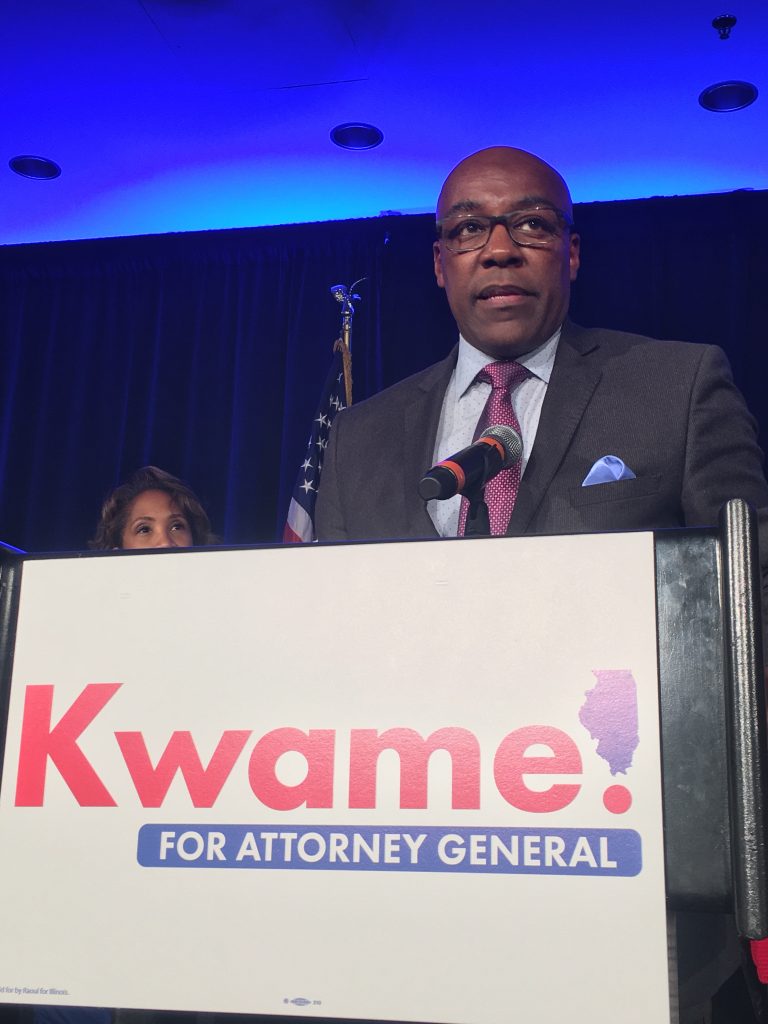 Attorney General-elect Kwame Raoul thanks supporters. [Hannah Meisel/The Daily Line]
Attorney General-elect Kwame Raoul thanks supporters. [Hannah Meisel/The Daily Line] -
Even Gov. Bruce Rauner’s most loyal supporters knew what they were walking into Tuesday evening at the governor’s Election Night party at Chicago’s Drake Hotel.
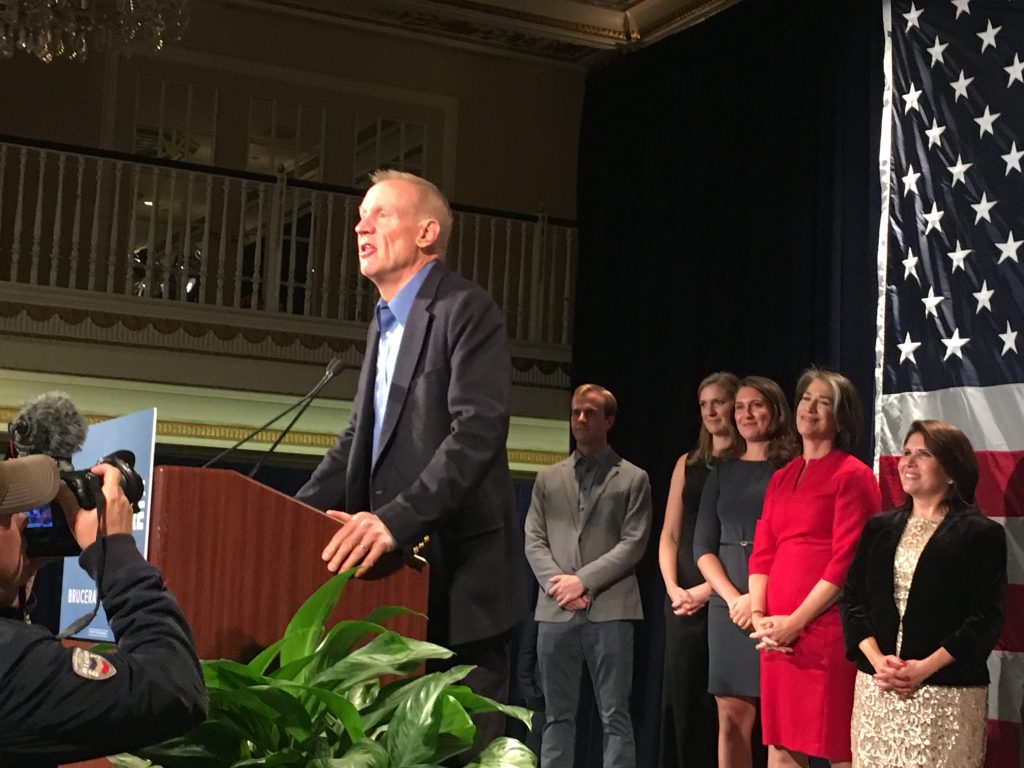 Gov. Bruce Rauner delivers his concession speech on Tuesday night. [Hannah Meisel/The Daily Line]
Gov. Bruce Rauner delivers his concession speech on Tuesday night. [Hannah Meisel/The Daily Line] -
Democrats swept all of the contests for statewide office Tuesday, sweeping Republican Gov. Bruce Rauner out of office. Democrat JB Pritzker won approximately 80 percent of the vote in Chicago, and took 60 percent in suburban Cook County, where turnout surged to the highest levels in more than three decades.
 J.B. Pritzker declares victory. [Twitter/JBPritzker]
J.B. Pritzker declares victory. [Twitter/JBPritzker] -
The "Porcelain Prince" sits on a toilet in front of the ILGOP tent at the 2018 Illinois State Fair. [Courtesy of @PritzkerMadigan on Twitter]
In June 2014, then-candidate Bruce Rauner arrived at a Chicago press conference he’d called to discuss the cost-savings measures he planned to bring Illinois’ budget into balance if elected governor. To illustrate his point, the Republican gubernatorial nominee brought along a few feathered friends.
-
While most polling and election data suggests that Asian American voters in Illinois are likely to vote for Democrats on Tuesday, a dark money group set up earlier this year is working to win those voters to the Republican Party.
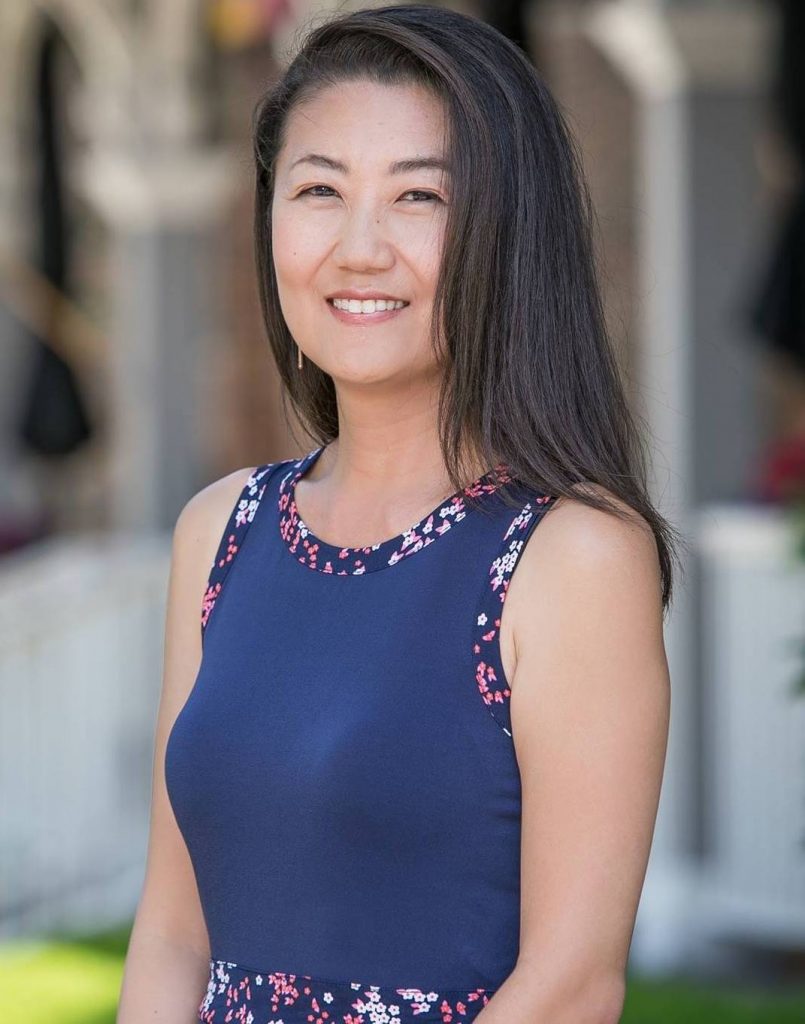 GOP House candidate Julie Cho
GOP House candidate Julie Cho
Asian American Advocacy, a non-profit organization set up in July, has funneled $154,200 to seven political action committees set up earlier this year, all with the stated purpose of electing Asian American Republicans to office. Asian American Advocacy has also sent $10,000 directly to GOP candidate Julie Cho, who is running against Democratic State Rep. Robyn Gabel (D-Evanston) in Illinois’ 18th House District.
Gabel has easily won that district in each of her four elections so far, beating Republican candidates by 62.8 percent and 64 percent in 2012 and 2016, respectively, and running unopposed in 2014. Her initial 2010 election was against a Libertarian candidate, and she won 99.6 percent of the vote.
Cho is also the beneficiary of the vast majority of the money funneled from the dark money group through the seven PACs — committees with names like Asian Voter Engagement PAC and Asian Americans for Family Values. As The Daily Line first reported in July, former New Trier Republican Organization committeewoman Danielle Mergner set up 10 such new committees this summer, making herself the treasurer of all of the committees. Two days after that story ran, Asian American Advocacy was set up, according to the articles of incorporation filed with the Illinois Secretary of State’s office.
Related: 10 new committees formed to marshal Asian American support for Republicans
The articles of incorporation do not specify which type of 501(c) organization Asian American Advocacy is, though the only type of charitable organization designation the group would be eligible for is 501(c)4, and many sources told The Daily Line that the organization is operating as a nonprofit social welfare organization that is not required to disclose its donors under that section of the tax code. Spending from those kind of committees is often referred to as “dark money.”
As a 501(c)4, Asian American Advocacy would be required to spend the majority of its money on a “social welfare purpose,” per federal Internal Revenue Service guidelines. 501(c)4 organizations are allowed to engage in some political activity.
501(c) organizations also do not have to file their taxes with the IRS until the end of the year, and it won’t be until many months after that until selections from Asian American Advocacy tax filings are released to the public in what’s known as a Form 990.
Until those tax forms are released, it will be impossible to determine how Asian American Advocacy spends its money, and if it is complying with the laws regulating its ratio of political activity to charitable giving. Illinois State Board of Elections spokesman Matt Dietrich told The Daily Line that the agency doesn’t monitor whether political donations are made by 501(c) organizations.
“We just enforce the reporting,” Dietrich said. “They have to report it by our rules for campaign contribution and just our general financial rules. but we don’t supervise the source of their giving or that kind of thing.”
Illinois is no stranger to dark money. Conservative talk radio host and former gubernatorial hopeful Dan Proft set up the Illinois Opportunity Project in 2011, which also operates as a 501(c)4 group.
But dark money remains a newer issue on the state level, with these kind of donations much more common in federal politics.
Two of Cho’s first campaign contributions were $1,000 and $500 donations from the Illinois Opportunity Project in March, designated for “legal fees” and paid in-kind to Chicago-based Svenson Law.
After the 10 PACs were set up this summer, four were shut down after the Illinois State Board of Elections found that the people who chaired the four were also the chairs of others within the group, which is a violation of Illinois law. However, another committee set up in March, called Lake Cook Asian Republicans, is also the beneficiary of Asian American Advocacy money, and is distributing money in a similar manner as the other six committees.-
- Asian Republican Alliance (shut down 8/15)
-
- Korean Americans for Illinois (shut down 8/22)
-
- Asians for Religious Freedom (shut down 8/15)
-
- Asians United (shut down 8/15)
Related: 10 new committees formed to marshal Asian American support for Republicans; 3 Asian American GOP committees disband; Another Asian American GOP committee disbands
Together, Asian American Advocacy and the political action committee appear to be coordinating an effort to drum up GOP support among Asian American voters, but their process so far has left many scratching their heads as to the strategy behind the campaign.
The money
An analysis of all the money received by Cho’s committee, Friends of Julie Cho, shows that the Wilmette Republican received more than 70 percent of her funding either directly through Asian American Advocacy itself, or funneled through the seven PACs that got funds from the group.
Click here to view four spreadsheets with all of the donations linked to Asian American Advocacy.
After initially making contact with Cho, The Daily Line’s subsequent requests for comment from Cho on the dark money source of her campaign funding went unanswered.
Conservative mega-donors have also given to Cho and the PACs publicly. One-time Rauner ally Richard Uihlein gave two $25,000 in donations to three of the PACs last week, while Chicago Cubs owner Todd Ricketts contributed $5,600 to Cho’s committee in mid-October.
Though many speculated to The Daily Line that Ricketts was behind the dark money effort, Ricketts’ spokesman Dennis Culloton said that would be impossible.
“As the finance chair of the RNC, he cannot be involved in coordinating with those other sorts of groups,” Culloton said.
In all, Asian American Advocacy gave $154,200 to the PACs — distributing the maximum $22,200 allowed by a 501(c) organization to six of the seven PACs, while the seventh received $21,000 — plus another $10,000 directly to Cho’s candidate committee. In eight transactions from July through September, Asian American Advocacy gave out a total of $164,200 in contributions.
Altogether, the seven PACs have spent $218,154 as of Sunday, the vast majority on Cho’s campaign. The expenditures included a combined $52,000 in in-kind contributions from two of the committees to a Virginia-based firm called Resonate for digital advertising.
Cho’s quarterly campaign expenditure report filed Sept. 30 showed she had paid $11,000 for production on a digital ad at the end of August, and subsequently paid Facebook nearly $1,000 for the digital ads on Sept. 30. Cho’s campaign Facebook page yields few posts, but one of them is a 90-second video introducing herself as someone who “will listen to people marginalized by partisan gerrymandering” and “will listen to business owners” in order to stem the flow of out-migration from Illinois.
Gabel, who has represented the 18th district since 2010, told The Daily Line that she’s worried about who may be behind the dark money flowing from Asian American Advocacy to the PACs, and subsequently to her opponent.
“My feeling is is that people deserve transparency,” she said. “It’s good to know where candidates are getting their money from.”
Though Gabel is a Democrat, her sentiment is also shared by a longtime establishment Republican and a fixture in the Asian American community, Steve Kim. Kim, who is currently a Illinois Human Rights Commissioner appointed by Gov. Bruce Rauner, and had most recently run for lieutenant governor with then-State Treasurer Dan Rutherford in 2014, told The Daily Line that he was aware of Asian American Advocacy and the seven PACs, but wanted to make sure that his group, the Illinois Korean American Republican Organization, was not associated with the dark money moving around.
“Everything is above board and legitimate,” Kim said. “How their [PACs are] working is not my business…We work in conjunction with candidates supported by the state party.”
Illinois Korean American Republican Organization incorporated a related PAC last summer, which has supported another Asian American GOP candidate this campaign cycle, Soojae Lee.
Lee, who is running against longtime State Sen. Terry Link (D-Waukegan) received $4,500 from the Illinois Korean American Republican Organization’s PAC last month, along with $5,500 from the PAC’s chair, Byoung In Suh. In August, Lee reported $2,500 from another establishment Republican, Deputy Gov. Leslie Munger, the former comptroller. Lee has also reported many small-dollar donations from those within the Korean American community.
Lee has also received $1,402 in in-kind contributions from four of the seven PACs that have received contributions from Asian American Advocacy — mostly small ad buys within Korean newspapers.
The third beneficiary of PACs funded by Asian American Advocacy is Karen Feldman, a Republican running against Democrat Daniel Didech for the 59th House District. That seat is currently held by outgoing State Rep. Carol Sente (D-Vernon Hills), who won re-election by smaller margins since first winning the seat in 2010, but notched a large margin of victory over her GOP challenger in 2016.
Feldman similarly received $1,401 in help from the PACs in newspaper ads for Korean-language publications.
However, campaign finance records as of Sunday showed that the PACs were also spending much more than they reported having in cash on hand.
The Korean Republicans PAC has reported spending $41,500 from its formation on July 5 — $40,000 of which was transferred to Cho’s campaign committee on two separate occasions. Compare that total spending with the $22,200 the PAC has reported taking in, and there is a difference of $19,300. Two of the other PACs are also spending thousands more than they’ve reported taking in, while the other four PACs have surpluses, according to the latest available data.
An attempt to speak to Mergner this summer was unsuccessful; after initially making contact, calls made to Mergner’s cell phone number from The Daily Line would result in a message that said the phone number was “disconnected.” However, recent attempts made to contact Mergner about the apparent spending discrepancies from another phone number show that Mergner’s cell number is in perfect working order. Messages left were not returned.
The people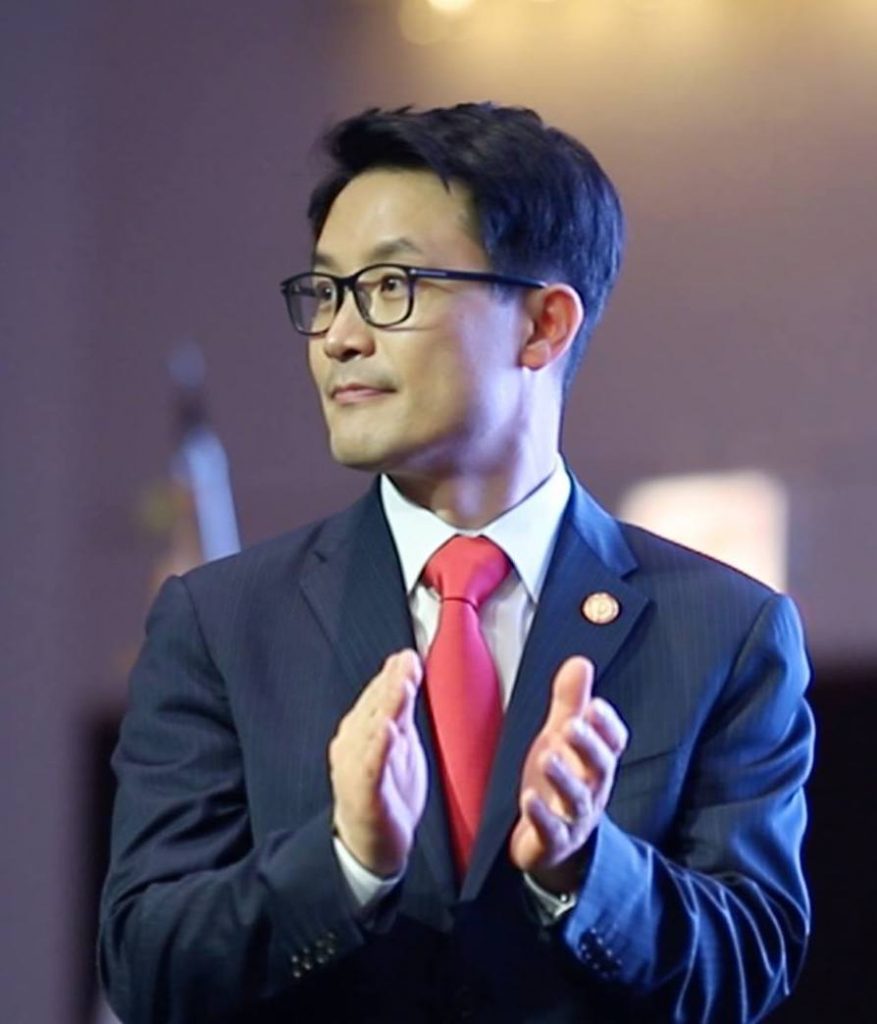 Itak Seo
Itak Seo
Asian American Advocacy was incorporated on July 11, according to records from the Illinois Secretary of State’s office. The agent who set up the organization is CT Law, P.C., a Wheeling law firm owned by attorney Itak Seo, who is also the president of the Korean American Association of Chicago, where Cho also serves as a vice president. Seo is also a Republican Trustee of Northfield Township.
Seo referred questions from The Daily Line about Asian American Advocacy to its three-person board. That board includes suburban residents Jin Hun Lee, Wakefield Bao and Kai Han. Han had not responded to The Daily Line’s multiple requests for comment as of Sunday night.
The chairs of the seven PACs have given small-dollar donations to Cho, campaign finance records show, and the chair of Cho’s campaign committee, Ann Jhin, is also the chair of the earliest PAC set up in March, Lake Cook Asian Republicans.
Sik Son of Korean American Voter Organizing Initiative & Community Empowerment, told The Daily Line that Seo and Asian American Advocacy board members are heavy-hitters within Chicagoland’s Korean American community. But he also said that he was disappointed in the leaders for using Asian American Advocacy to spend dark money.
Son also alleged Asian American Advocacy hijacked KA VOICE’s get-out-the-vote event Oct. 28 at Glenview’s Village Hall. While KA VOICE is a nonpartisan organization, Son said, Asian American Advocacy deployed volunteers to the event and began endorsing specific GOP candidates.
“They also accused my organization of helping Democrats,” Son said.
Son maintained KA VOICE does not advocate for Democrats or any specific candidates, and said he’s complained about Asian American Advocacy to other members of leadership within the Korean American community for “ruining” the early voting event.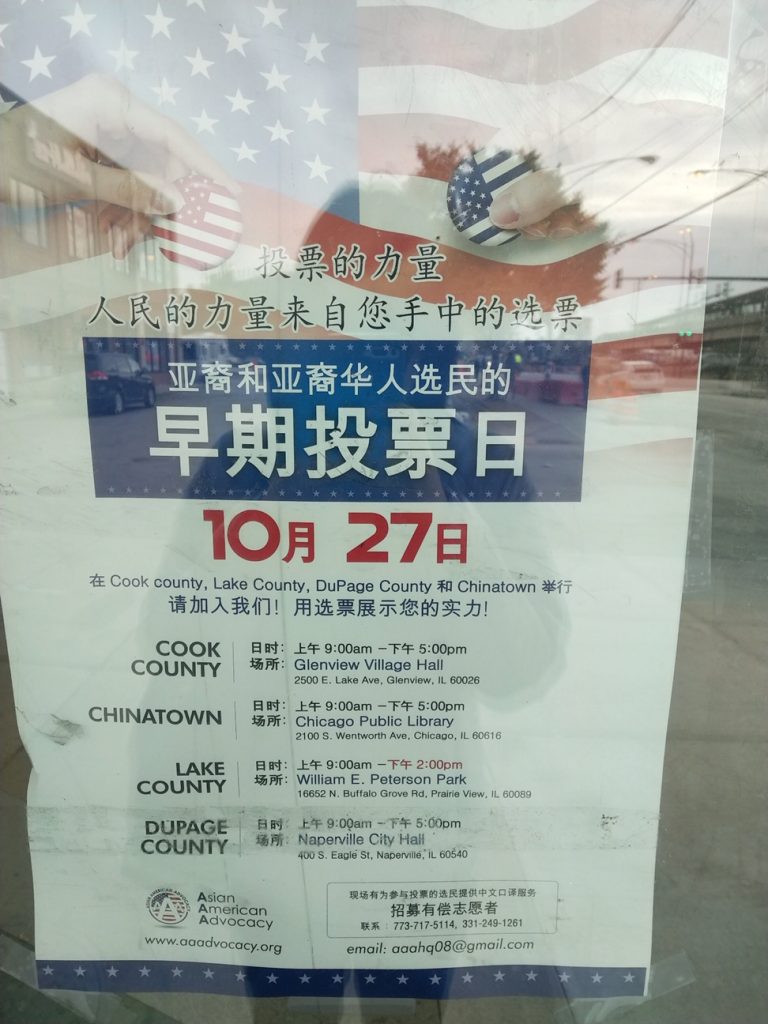 An Asian American Advocacy ad in a window promotes Early voting on Sunday, Oct. 27 in three suburban locations and in Chinatown.
An Asian American Advocacy ad in a window promotes Early voting on Sunday, Oct. 27 in three suburban locations and in Chinatown.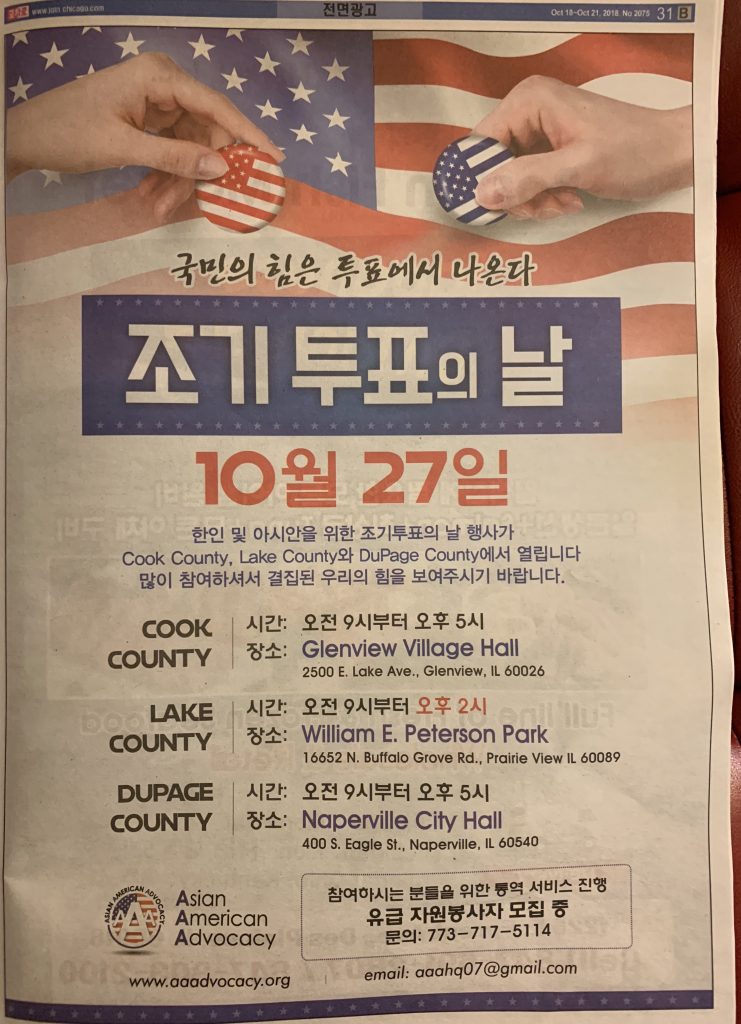 An Asian American Advocacy ad in a Korean newspaper promotes Early voting on Sunday, Oct. 27 in three suburban locations.
An Asian American Advocacy ad in a Korean newspaper promotes Early voting on Sunday, Oct. 27 in three suburban locations.
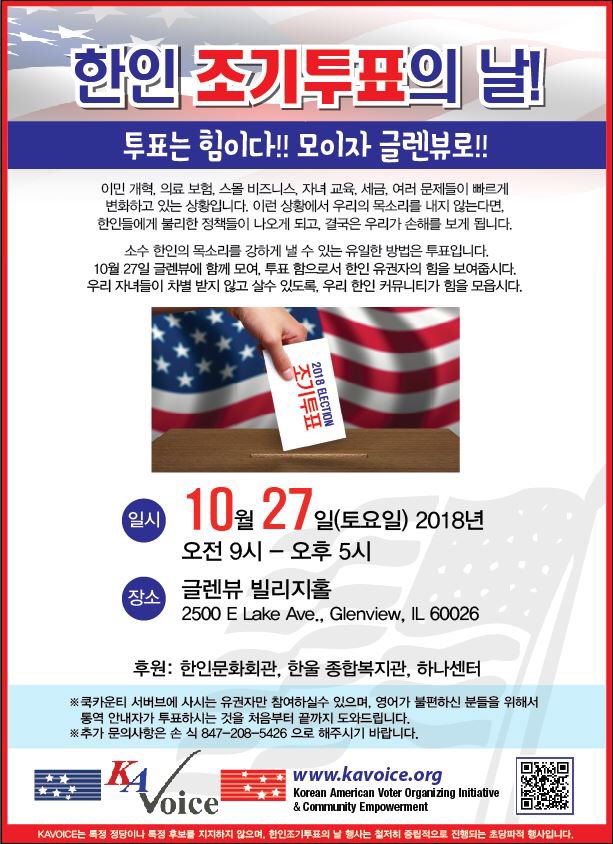 A flyer made up by Korean American VOICE promotes Early voting on Sunday, Oct. 27 in Glenview
A flyer made up by Korean American VOICE promotes Early voting on Sunday, Oct. 27 in Glenview
State Rep. Theresa Mah (D-Chicago) also alerted The Daily Line to Asian American Advocacy activity at an early voting polling place in Chicago’s Chinatown, within her House district.
Asian American Advocacy volunteers set up a kiosk in at the local library branch and had been giving out sheets of paper instructing voters to vote for GOP candidates, and telling them to skip the races in which Democrats were running unopposed, said Mah, who does not have an opponent on Tuesday.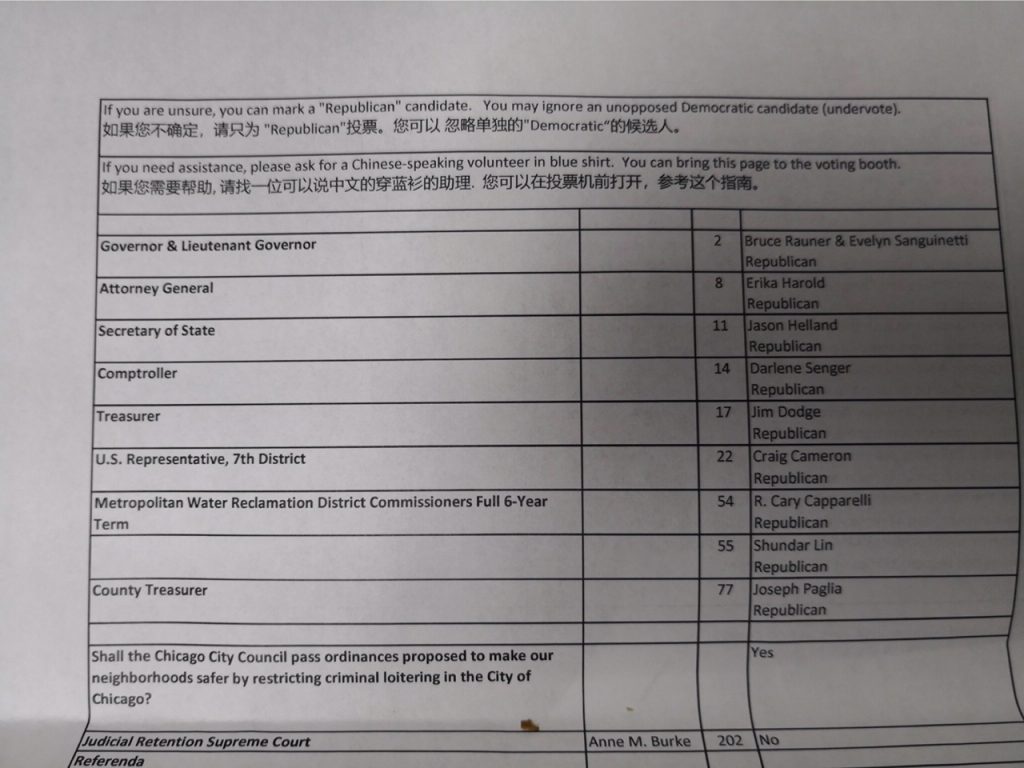 A paper volunteers from Asian American Advocacy handed out to voters in Chinatown last week, which instructs voters to cast ballots for Republicans and skip voting in races where Democrats are running unopposed.
A paper volunteers from Asian American Advocacy handed out to voters in Chinatown last week, which instructs voters to cast ballots for Republicans and skip voting in races where Democrats are running unopposed.
Mah also said that in the week since, she’s heard from others who witnessed Asian American Advocacy’s presence at early voting events in Naperville and Prairie View, in addition to Chinatown and Glenview.
“What I thought was remarkable was that they were organized enough to have four early voting events in different parts of Chicagoland area,” she said. “I was a little caught off guard with the Republican slate sheet. I really wasn’t expecting them to come down to Chinatown because if it was a bunch of dark money groups helping Julie Cho, why would they come to Chinatown?”
Chicago Board of Elections spokesman Jim Allen told The Daily Line that the definition of “electioneering” is very strict, and does not seem to encompass Asian American Advocacy’s alleged activities in Chinatown. He also said he would have needed to receive an official report of wrongdoing, and to his knowledge had not been notified.
Asian American Advocacy has also send out mailers to voters in at least two districts — the 6th Congressional district and the 55th House District, where State Rep. Marty Moylan (D-Des Plaines) is the incumbent. The mailers, printed in Chinese, English and Devanagari, an alphasyllabary used in India and Nepal, give information for the GOP candidates in the races, but say the Democrats did not respond to the survey sent out Sept. 24.
[gallery type="slideshow" ids="62562,62563,62568,62567,62564">
The mailer for the 55th House race focuses on partisan gerrymandering, while the mailer for the 6th Congressional race gives information on Congressman Peter Roskam’s positions on illegal immigration. Under a picture of Roskam’s opponent, Democrat Sean Casten, the mailer says Casten did not respond.
Casten’s campaign told The Daily Line that it did indeed receive the survey earlier this fall, but when staff went to research Asian American Advocacy and found nothing online, they replied to the email to ask when the group needed the survey completed. The Casten campaign said when Asian American Advocacy responded, the organization gave the campaign just three hours to finish the questionnaire.
Asian American Advocacy has recently set up a website, but the landing page only says “Welcome to Asian American Advocacy: Website coming soon.” A Who Is record search did not turn up who set up the site or when the URL was claimed.
One of the mailers sent to voters in the 6th District listed Asian American Advocacy's return address as 5941 N. Lincoln Ave. in Chicago, which is also the address of the Korean American Association of Chicago, a 501(c)3 organization. Another of the mailers lists Asian American Advocacy's return address as 199 N. Milwaukee Ave. in Wheeling — the same address as Seo's law office.
The demographics
Of the 796,819 Asian Americans in Illinois, 409,807 are eligible voters, according to AAPI Data, a project at the University of California Riverside dedicated to tracking demographics and public opinions of Asian Americans and Pacific Islanders. Illinois’ Asian American population has grown by 64 percent since 2000, and has become an increasingly important part of the electorate.
AAPI Data Founder and Director Karthick Ramakrishnan told The Daily Line that while Asian Americans in general tend to vote Democratic, there are differences between the voting behavior of certain ethnicities. Vietnamese Americans, for example, are traditionally GOP voters, Ramakrishnan said. Japanese American voters tend to gravitate toward Democrats. But Filipinos and Chinese Americans tend to be split, he added.
Korean Americans, like many of those involved in Asian American Advocacy and funding Cho, historically have tended to be registered Republican voters, Ramakrishnan said, though recent research suggests Korean Americans are more likely to vote for Democrats in the 2018 election cycle. The Korean American community includes many Evangelical Christians, but Ramakrishnan said that Korean American Evangelicals are not as conservative as white Evangelicals.
Asian Americans have also traditionally been ignored by the political process, especially in big “machine” cities like Chicago, Ramakrishnan said. Therefore, both parties have recently been making appeals to the Asian American community.
“Most Asian Americans didn’t grow up in a Republican household or Democratic household, so don’t have strong party attachment,” Ramakrishnan said. “It ends up being a kind of catch-22 where you have low party identification. That means low participation…those voters are not taken seriously.”
The way to break the cycle, Ramakrishnan said, is through voter education and mobilization, but also through Asian Americans themselves running for office.
“Essentially when Asians run for office, they recognize the value of outreach to communities,” Ramakrishnan said.
He pointed to GOP candidate Young Kim running for California’s 39th Congressional District. Ramakrishnan said Kim, who would be the second-ever Korean American in Congress if elected, is receiving “a fair amount of political contributions from Korean Americans.”
“It’s not a deep love for the Republican Party that’s motivating Korean Americans for Young Kim,” he said.
Chinese American GOP support
Korean Americans are not the only Asian American group who have found a place within the Republican Party. Chicago-based Asian American GOP Coalition invited State Rep. Jeanne Ives (R-Wheaton) to march with the organization in Chinatown’s Lunar New Year parade in February, as Ives was running against incumbent Rauner.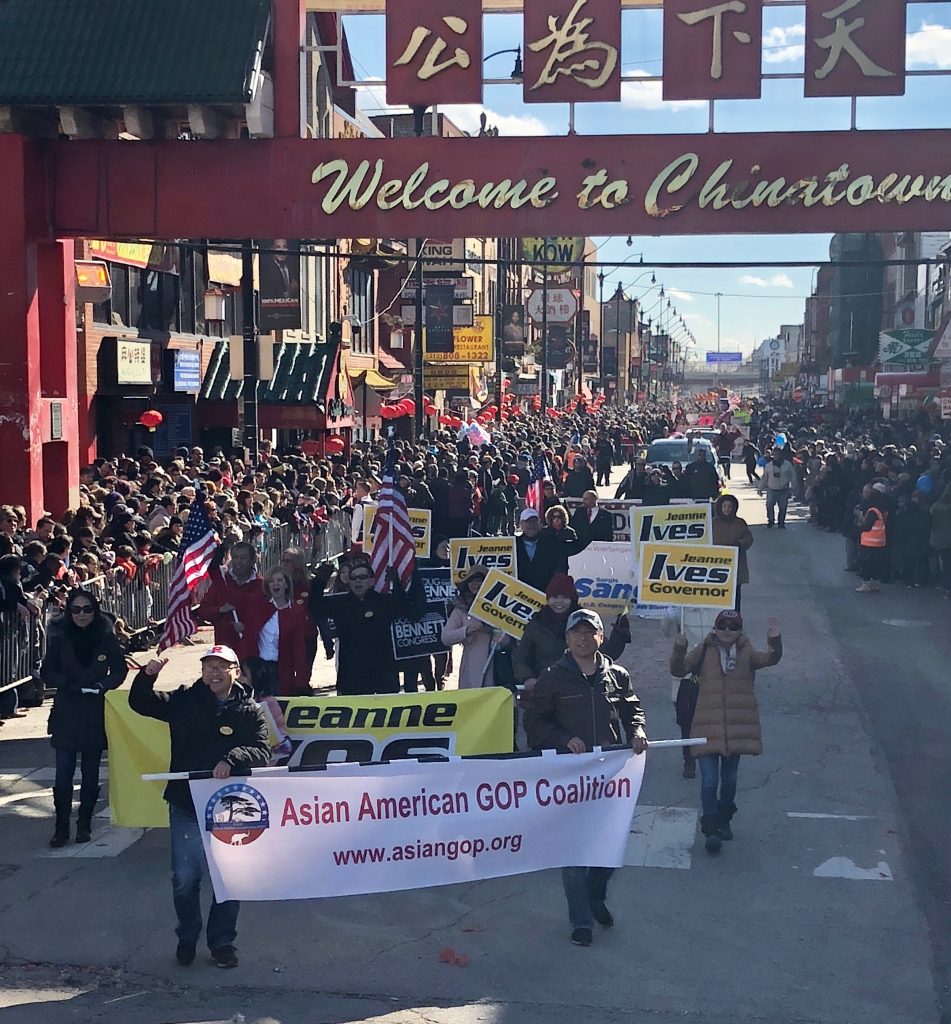 Conservative Rep. Jeanne Ives (R-Wheaton) marches in the Lunar New Year Parade in Chicago's Chinatown neighborhood in February. Ives' insurgent primary campaign for governor attracted voters upset with Gov. Bruce Rauner for broken promises on issues both fiscal and social. Photo courtesy of Rep. Theresa Mah (D-Chicago).
Conservative Rep. Jeanne Ives (R-Wheaton) marches in the Lunar New Year Parade in Chicago's Chinatown neighborhood in February. Ives' insurgent primary campaign for governor attracted voters upset with Gov. Bruce Rauner for broken promises on issues both fiscal and social. Photo courtesy of Rep. Theresa Mah (D-Chicago).
Asian American GOP Coalition also hosted a recent lunch with Republican attorney general candidate Erika Harold, which Harold acknowledged on Twitter on Sunday.
Asian American GOP Coalition President Grace Cui told The Daily Line that her chapter is one of many across the country, and that earlier in the fall, the organization held a roundtable discussion with Rauner and Roskam.
Cui said she and others in her community became involved in Republican politics because of President Donald Trump, back when he was a candidate in 2015. Cui said Illinois can stand to take a page from Trump’s book.
“[Trump] can make America Better than right now,” she said. “Illinois is very bad, the tax[es are] going very high, people [will] move to another state...People will just move out.” -
-
“How did you get my number?”
Thousands of registered voters statewide have asked variations of that question of the campaign worker or volunteer at the other end of text message blasts in recent weeks — one of the latest strategies in voter persuasion and get-out-the-vote efforts that many Illinois campaigns have embraced this year. -
The Illinois Department of Corrections is still failing to provide adequate psychiatric care to mentally ill prisoners even after a 2016 settlement agreement mandated that state officials change their policies and speed up access to treatment, an Illinois federal judge ruled this week.
-
A group called the Cook County Democratic Women is giving Gov. Bruce Rauner its support instead of Democrat JB Pritzker after 10 current and former members of Pritzker’s campaign staff members alleged racial discrimination and mistreatment. Meanwhile, Rauner’s newest “voter report card” mailers caused at least one voter discomfort and annoyance.












